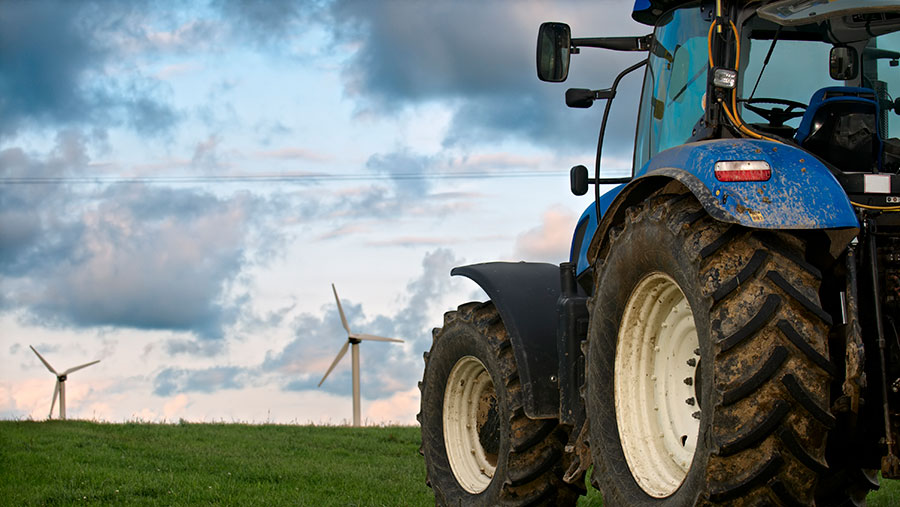Advertiser content
Helping agri-businesses on the road to net zero
Provided by
Lloyds Bank is committed to being a leading UK commercial bank for sustainable growth, helping our clients’ transition to sustainable business models and operations, and to pursue clean growth opportunities.
 © iStock
© iStock Agriculture businesses have a significant role to play in helping the UK achieve net zero targets. Not only do they contribute 10% of the UK’s total greenhouse gas emissions, they own or manage 70% of the UK’s land stock, providing a unique resource in the ability to tackle climate change (From Now to Net Zero: A Practical Guide for SMEs | Lloyds Bank).
The agricultural sector also faces significant climate-related risks, including flooding, drought and depleted soil.
At the COP26 summit, the UK was among 26 nations to set out new agricultural commitments, pledging to engage 75% of farmers in low carbon practices by 2030 (Nations and businesses commit to create sustainable agriculture and land use).
Another key pledge included reducing methane emissions by 30% compared to 2020 levels by the end of the decade – something agriculture will play a significant role in as methane accounts for 56% of the sector’s emissions.
The following recommendations from leading agricultural industry bodies and the scientific community are the most impactful activities you can undertake at farm level to begin your net zero journey.
1. Measure your carbon footprint
Having a comprehensive understanding of your carbon footprint can help you create an action plan for lowering it.
Carbon calculators like Farm Carbon Calculator, Agrecalc or Cool Farm Tool can identify sources of emissions, benchmark your emissions and create a baseline for monitoring progress towards low carbon farming practices.
2. Increase trees and hedgerow planting
Reforestation is a powerful way to fight climate change, with trees and hedgerows acting as ‘carbon sinks’ that naturally absorb carbon emissions from the air, as well as protecting valuable topsoil, offering protection from floods and helping boost biodiversity.
Our partnership with the Woodland Trust can help agricultural businesses plant trees and hedgerows at heavily subsidised rates.
3. Improve productivity and efficiency
Sustainability is at the heart of many new farming practices. Precision farming, using controlled-release fertilisers and increasing use of organic manures, can contribute to a reduction in nitrous oxide emissions, while gene editing and breeding, as well as improving livestock health, can lower methane emissions.
4. Invest in low-carbon agri-technology
The rapidly growing agri-tech market can play a key role in helping farms become more sustainable.
Sustainable intensification by investing in solutions like nitrogen-fixing bacteria, vertical farming and drones, aims to improve productivity with reduced inputs and lower environmental impact.
5. Boost renewable energy generation
Circular waste streams such as Anaerobic Digestion (AD), which involves converting animal manure, food waste and crop by-products into energy, are becoming increasingly popular (Is there still a future in AD plants for UK farmers?), with 642 AD plants operational in the UK in April 2021 and over 200 more under construction.
Alongside generating clean energy, AD plants can offer opportunities for generating extra income and improving waste management.
6. Improve soil health
The UK’s soil currently contains the equivalent of 80 years of carbon emissions. However, depleting fertile topsoil levels mean improved farming practices are needed to help rebuild the soil’s carbon stores and prevent the loss of greenhouse gases.
Soil health could be improved by:
- using cover crops within crop rotations to help maintain organic matter
- management and timing of cultivations and grazing pressure to reduce soil compaction
- planting more trees in ‘shelterbelts’ along field boundaries to help prevent soil erosion
- introducing minimum till cultivation and regenerative grazing practices.
7. Restore peatlands
Peatlands are a key part of the UK landscape, covering 12% of the nation’s land area. Historically they’ve acted as a significant carbon sink.
However, as a result of modification, drainage and damage over the years, they are now a source of carbon emissions.
Adapting grazing routines and considering grip blocking, drainage and re-wetting peat soils to restore natural functioning of peatland can all help prevent erosion and loss of carbon emissions from peat soils.
How we’re supporting agri-businesses:
- All relationship managers have received expert sustainability training from the Cambridge Institute for Sustainability Leadership
- As part of our partnership with the Woodland Trust we’re offering subsidised funding for 0.5ha – 5ha of new woodland
- Discounted lending through our Clean Growth Financing Initiative – for a broad range of sustainable agriculture investments
- Help with finding a suitable free carbon calculator
- Regular Sustainability Webinar sessions on a range of environmental and low-carbon issues
Visit lloydsbank.com/sustainable-agriculture to find out more. All lending is subject to status.
